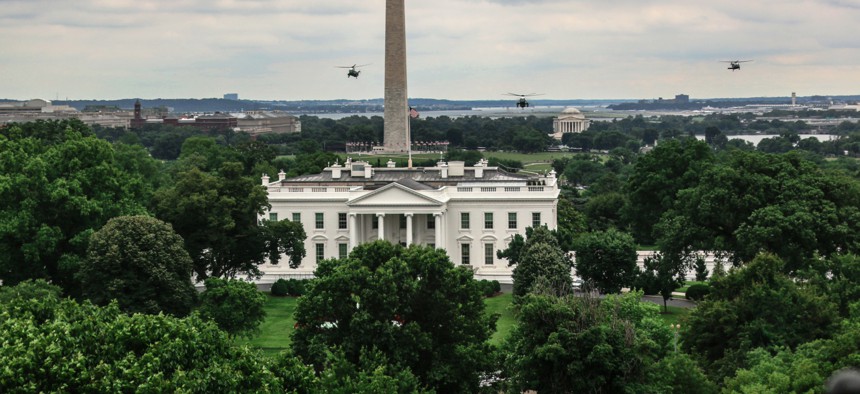Trump’s Election Integrity Commission Hasn’t Officially Met Yet—And It May Have Just Violated Federal Law

The White House Shutterstock

Connecting state and local government leaders
The commission could be in violation of the Federal Advisory Committee Act for making decisions during an “organizational” call.
WASHINGTON — When President Trump’s Election Integrity Commission made decisions regarding a letter sent to secretaries of state requesting voter roll data on a call Wednesday, they may have violated a federal law that requires federal committee meetings to be posted publicly in advance and open to the public.
The commission appears to be subject to provisions of the Federal Advisory Committee Act (FACA), according to the charter of the commission and the FACA Database. As such, the law requires certain levels of transparency in decisionmaking.
“When members of a FACA committee discuss substantive work, there should be public notice, [it should be] publicly open, and there should be minutes available,” explained Allison Zieve, director of Public Citizen’s Litigation Group.
The question is whether “substantive” work occurred on a call that took place Wednesday prior to the release of the letter sent to secretaries of state. As Route Fifty reported on Thursday, members of the commission discussed the release of a letter from the commission during that call.
A spokesman for Vice President Pence, who chairs the commission, as well as Maine Secretary of State Matt Dunlap, a Democrat who serves on the commission, confirmed that the letter was discussed during the call and the letter was sent out on behalf of the entire commission. Sources noted that there were discussions over both content and wording of the letter, as well as who would sign it. Pence’s press secretary, Marc Lotter, also said “there were no objections raised and so... the letter went out."
“Though this phone call walks the line and could have been considered an organizational call, the fact that they released product from it that was agreed upon and disseminated widely, smacks of an official meeting,” Public Citizen’s vice president of legislative affairs, Lisa Gilbert, explained in an email on Friday. “To be safe it would have served them well to document it as such.”
Scott Amey, general counsel for the Project On Government Oversight, went further in an email:
“There is value in creating a Commission on Election Integrity. The Commission, however, likely broke federal rules on its first day of work. There are legal responsibilities for Commission operations, including providing advanced notice and holding meetings that are open to the public. It seems that in a preliminary call, substantive work was discussed and actions were taken in violation of those rules. It’s a minor violation, but we have checks and balances to ensure that the government doesn’t run amok, and public notice and participation are essential to any democracy. I would imagine that the Commission will receive counseling about the Federal Advisory Committee Act and stay in bounds in the future.”
On Wednesday, 16 Democratic senators sent a letter to Vice President Pence, and the commission’s vice chair, Kansas Secretary of State Kris Kobach, seeking “to ensure the Commission’s compliance with the Federal Advisory Commission Act (FACA).”
In the letter, the senators state:
“These requirements include holding meetings open to the public with timely advance notice; allowing interested persons to attend and file statements; maintaining minutes of any meetings; and making all records, drafts, and documents available to the public.”
As the senators explain in their letter to Pence and Kobach: “The FACA was established to promote transparency and accountability in government and sets certain openness and transparency requirements that govern the Commission’s work.”
FACA also requires that the commission be fairly balanced in terms of the points of view represented, another issue that the senators inquired about in their letter.
“I think what they want to do is get the imprimatur of FACA, meaning that they’ve gotten advice from a balanced group of the public… [which] would include public election officials,” Alan Morrison, an associate dean for public interest and public service law at the George Washington University Law School, said in an interview with Route Fifty on Friday. “But they don’t seem to want to comply with the requirements of FACA—public meetings and announcements in advance.”
According the Federal Advisory Committee Act (FACA):
“Except when the President determines otherwise for reasons of national security” meetings must be published in the Federal Register in advance and open to the public. Meetings are defined as “at least the number of individual agency members required to take action on behalf of the agency where such deliberations determine or result in the joint conduct or disposition of official agency business…”
Organizations like Citizens for Responsibility and Ethics in Washington, a government ethics and accountability group, have questioned whether the administration is violating FACA laws on multiple fronts, with concerns raised about meetings utilized in the decision to nominate Supreme Court Justice Neil Gorsuch, as well as Trump’s meetings with CEOs and labor leaders around his “Manufacturing Jobs Initiative.”
In the case of the president’s Manufacturing Jobs Initiative, the administration was clear in stating: “No consensus advice or recommendations resulting from group deliberations or interaction is expected or will be solicited.”
That case is quite different from the Executive Order on the Establishment of Presidential Advisory Commission on Election Integrity, which specifically calls for recommendations.
According to Morrison, there are no significant direct penalties for not complying with FACA regulations.
“The biggest penalty… is the recommendations are going to be discredited,” Morrison stated. “I think many people would think that we should just take the recommendations and take them to the trash can where they belong.”
Mitch Herckis is the Senior Director of Programs for Government Executive’s Route Fifty and is based in Washington, D.C.

NEXT STORY: The American South Will Bear the Worst of Climate Change’s Costs





